Dog lovers are a special group as diverse as the canines they share their lives with. However, those who love large and giant breed dogs also tend to share many similar experiences. From less space and money to more drool and poop, here are 12 things only big dog owners will understand!

The 12 Things Every Big Dog Owner Understands
1. Size Doesn’t Matter
Don’t be fooled by how small your big dog is when they are a puppy; they’re probably going to grow for a lot longer than you think! And even when your big dog does reach their full size, they probably won’t ever act like it.
We’ve probably all seen the social media pictures and videos of giant dogs still insisting on curling up in their owner’s laps, even when they’re so big that only their rear end will fit. If your big dog gets used to being carried and snuggled as a puppy, don’t expect them to give it up when they are 100 pounds heavier.
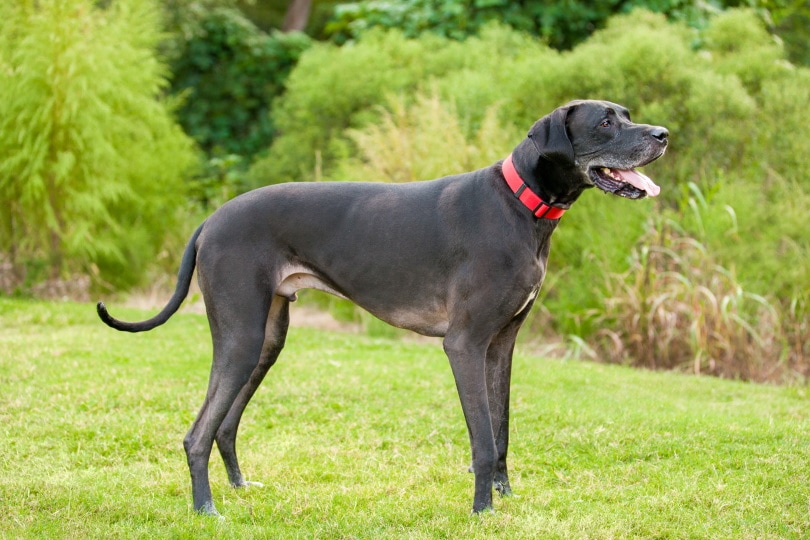
2. A Lot Goes in, and a Lot Comes Out
It takes a lot of fuel to keep a big dog going, especially when they’re still in their seemingly endless growth period. Big dog owners all understand that they will be buying plenty of kibble to keep their pups from going hungry. And what goes in must come out eventually, right?
Big dogs can fill up a poop bag and make frequent yard pick-ups necessary. Your dog food choice will impact how much your dog eats and poops based on how digestible and calorically dense it is. Also, if your big dog seems abnormally hungry, isn’t putting on weight, or has loose, frequent stools have them checked out by your vet to ensure there’s nothing wrong.
3. Everything Is More Expensive
Speaking of the vet, every big dog owner also knows that their medical bills will be much more expensive. Because so many medications are dosed based on weight, bigger dogs will always need larger quantities of everything from heartworm preventatives to antibiotics.
If your big dog needs surgery, it’ll take more anesthesia to keep them asleep, more stitches to close them up, and more fluids to keep them hydrated. Even more so than small dog owners, big pup parents need a plan to pay for unexpected medical costs, whether a savings account or a pet insurance policy.
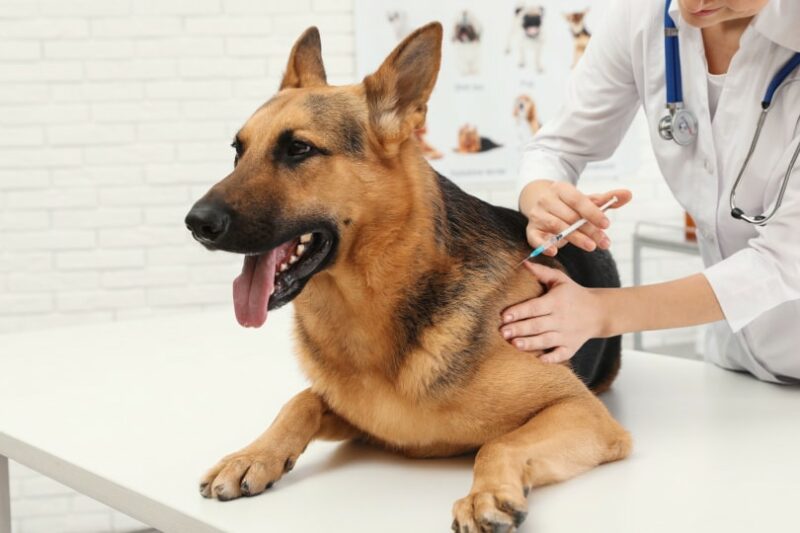
4. Next Level House-Proofing Is Required
Every dog owner knows it’s important to keep dangerous items or things you don’t want your pup eating or breaking out of reach. However, big dog owners must take their house-proofing to the next level because their pets can reach spaces smaller breeds can’t.
Putting a plate of cookies on the kitchen counter should be safe from a Pomeranian, but not a Great Dane who is at nose-level with the goodies without needing a boost! Keep forbidden objects off the counters and safely locked away to avoid concerns.
5. Who’s Really Getting the Bath Here?
Bathing a big dog might end up with you getting just as soaked as your dog. Most of them are too big for a standard bathtub; even if they fit, they’ll drench you and everything in the vicinity as soon they give one good shake.
You’re in for an adventure if your big dog doesn’t like baths. In that case, getting the job done may take more than one person and many treats. Maximize your chances of success by getting your dog used to baths when they are a more manageable size.
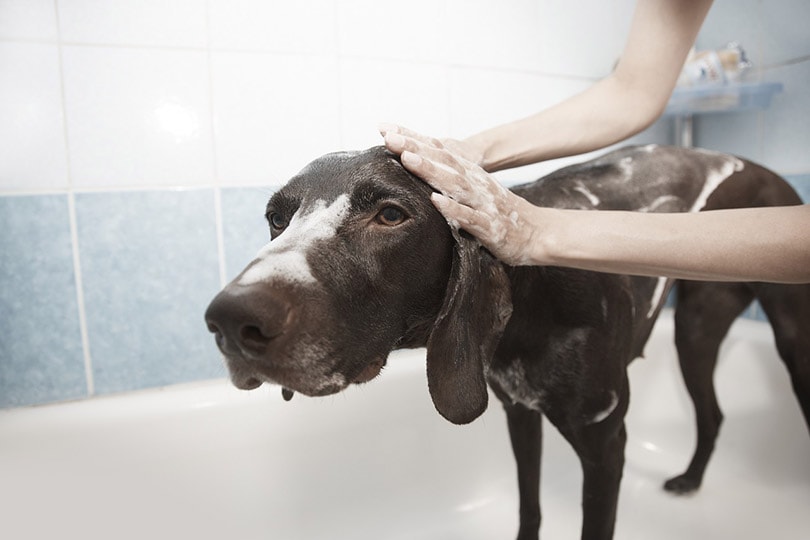
6. Training Isn’t Optional
Early socialization and training are recommended for every dog, regardless of size. However, it can be a lot easier to deal with a misbehaving 8-pound adult dog than it is an 80-pound one. Giant breed dog owners should be especially mindful of this reality, as their pups may outweigh them when fully grown.
Being dragged down the sidewalk by an out-of-control big dog is no fun and is potentially dangerous. Get started early with leash manners, obedience training, and plenty of socialization. If you don’t feel confident doing it on your own, look for training classes in your area that use positive reinforcement techniques.
7. Hide Your Breakables
If you’re a person who likes to display fragile collectibles and keepsakes on low shelves and tables, you may want to think twice about your decorating scheme before bringing a big dog home.
Many big dogs seem to have tails at just the right height for clearing a coffee table or low shelf of every breakable item present. Big dogs like Labs and Goldens never seem to stop wagging, either! Invest in some taller display shelves or store your keepsakes safely away from your happy dog’s tail.
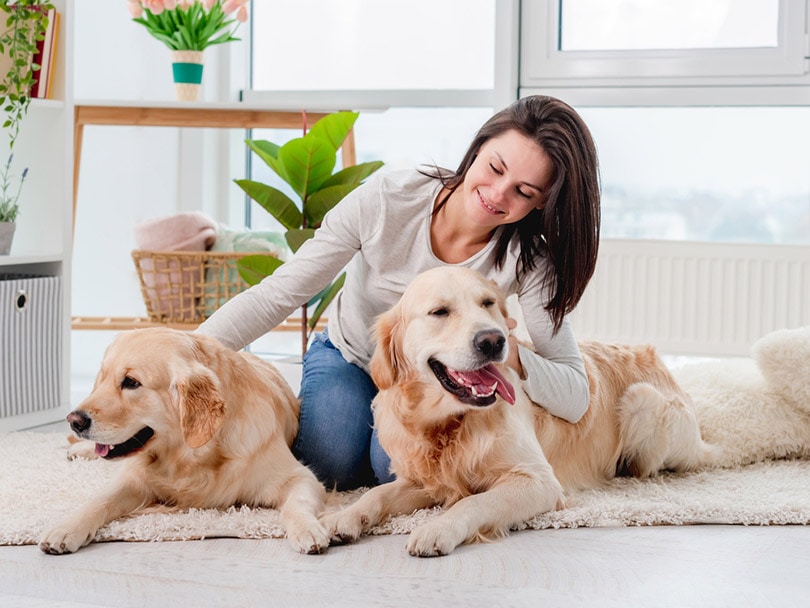
8. We’re Going To Need a Bigger Bed
Here’s one to keep in mind if you think it’s cute to let your large-breed puppy snuggle up in bed with you. That habit will be hard to break when they get older and much larger. If you want to share a bed with a big dog, you will need to upgrade your sleeping space or get used to stolen covers and curling up in a tiny corner.
Big dogs like to sprawl out, and most of them laugh in the face of maintaining personal space.
9. Expect a Mess
In addition to their larger body size, big dogs produce a lot more mess with their bodies. Many dogs shed, but the big ones will leave your floor looking like a new carpet.
Several canines drool, but the true champions all seem to be giant breeds like Saint Bernards and Mastiffs. And we aren’t talking about a little bit of drool, either. But what would you expect from a dog of that size? Big dogs also make more of a mess by getting into mud and dirt outside and destroying your possessions indoors if they develop behavioral issues.
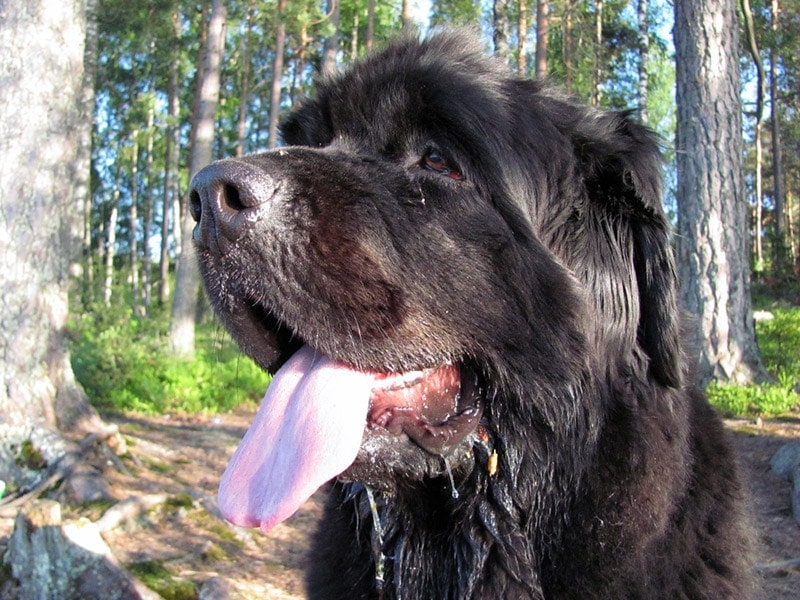
10. Energy Levels Aren’t Created Equal
You might expect a big dog to have an increased energy level to match its size, but that’s not always the case. Some big dogs, like Labs and German Shepherds, have seemingly endless stores of energy and can quickly develop bad behavior if they don’t get enough exercise.
On the other hand, many giant breeds, such as Mastiffs, have moderate exercise requirements and spend much of their day snoozing. What is true is that it’ll take a lot more effort to exercise a big dog than it does a smaller one, so you may want to invest in some good running shoes.
11. Car Safety Is Key
Big dogs can make excellent adventure buddies, and many enjoy road trips. However, large and giant breed owners must pay extra attention to car safety. In the event of an accident, a big unsecured dog becomes a very heavy projectile that can injure you or someone else in the car, not to mention themselves.
An over-excited big dog can also be a dangerous distraction to a driver. Keep your pup secured with a dog seatbelt, tether, or safety barrier, so everyone reaches their destination safely.
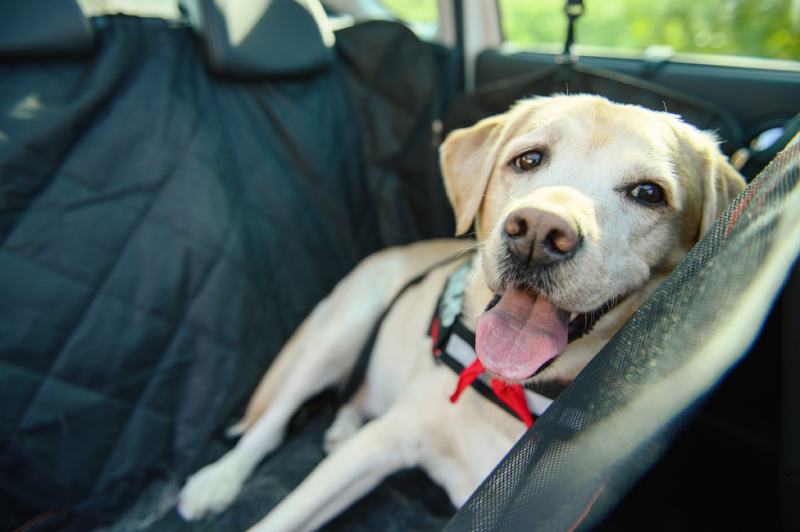
12. Your Dog Will Never Get the Benefit of the Doubt
Unfortunately, this is a reality that every big dog owner needs to be aware of. If your dog is involved in any fight with a smaller pup, there’s a good chance they’ll be blamed even if the little one started the drama. A similar scenario may develop if your rambunctious big dog accidentally knocks over a toddler.
The dog may not have known any better, and maybe the child wasn’t well-supervised, but it may not matter. Owners of breeds unfairly stereotyped as “aggressive” need to be even more cautious to ensure their dogs are always well-trained, under control, and on their best behavior.
 Conclusion
Conclusion
These 12 things are presented partly for entertainment, but they also give you a quick snapshot of what life is like with a big dog. Big dogs are often over-represented in animal shelters simply because their original owners didn’t realize how much they’d grow or how much they would eat.
This list and more extensive research into your breed of choice can help ensure you’re financially, physically, and mentally prepared to share your life with a big dog.
Featured Image Credit: wavebreakmedia, Shutterstock
Contents
- The 12 Things Every Big Dog Owner Understands
- 1. Size Doesn’t Matter
- 2. A Lot Goes in, and a Lot Comes Out
- 3. Everything Is More Expensive
- 4. Next Level House-Proofing Is Required
- 5. Who’s Really Getting the Bath Here?
- 6. Training Isn’t Optional
- 7. Hide Your Breakables
- 8. We’re Going To Need a Bigger Bed
- 9. Expect a Mess
- 10. Energy Levels Aren’t Created Equal
- 11. Car Safety Is Key
- 12. Your Dog Will Never Get the Benefit of the Doubt
- Conclusion

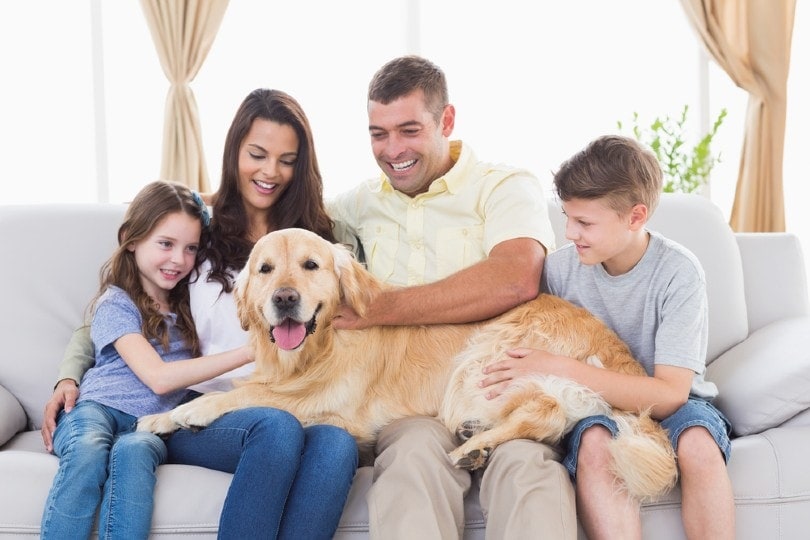
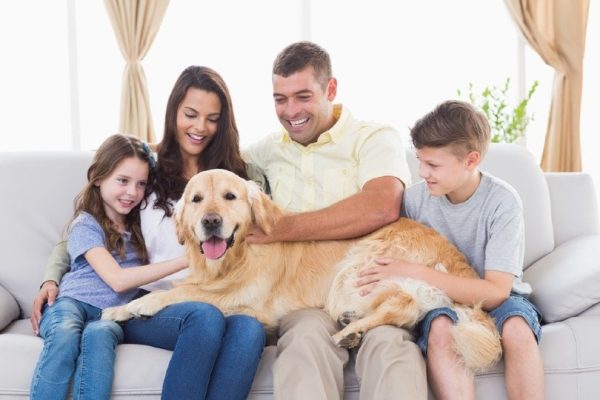
 Conclusion
Conclusion





